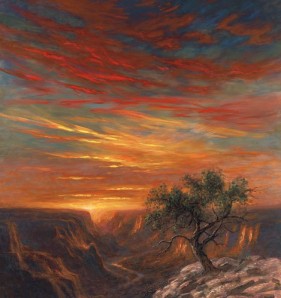 “Are you sure you don’t want some of my water?” my brother David asked, extending his canteen.
“Are you sure you don’t want some of my water?” my brother David asked, extending his canteen.
“I’m fine,” I grumbled irritably.
“What about some protein bars or snacks?” he asked. “Rob and Julie have lots of extra. I’m sure they’d be happy to give you some.”
“No, seriously,” I said, gritting my teeth. “I don’t need any of that stuff. I’m fine. I can do this.”
It was May 2011 and my older brother David had invited me to hike the Grand Canyon with him and his in-laws. We had taken Kaibab trail, a grueling 25-mile hike from the South Rim to the North Rim with a staggering 4,780-foot change in elevation—downhill and then uphill. But none of that bothered me. After all, I had worked for several years at a wilderness therapy program in Arizona. I knew all about heat, hiking, and hydration. I knew how to do this.
But by the time we had passed the halfway mark, I became painfully aware that I wasn’t exactly Indiana Jones. In fact, I was starting feel more like the shriveled corpse who “chose poorly” in The Last Crusade.
As the day dragged on, I couldn’t help but complain. “The sun is so hot! Did it move closer to the earth or something?” “How much farther is it? What do you mean we’ve only gone three miles?” “I don’t think I can do this. My legs feel like they’re going to fall off.” “I never should have done this.”
David quietly listened to my complaints, occasionally offering me a share of his water. As we neared the end of the trail (and what felt like the end of my life), I finally accepted his offer, and greedily guzzled his water.
We reached the top of North Rim just as the sun was beginning to set. I looked upon our SUV as if it were the Angel of Mercy. Without a second thought, I hobbled towards the car, eager to bask in the blessing air-conditioning. David didn’t follow me. Instead, he paused and looked out across the Grand Canyon.
He shook his head softly. “Pretty amazing, isn’t it?”
“Yeah, sure,” I said, wiping the sweat from my forehead. He had the keys to the car, so I was compelled to humor him.
“I guess that’s kind of like life,” he went on, still gazing out at the Grand Canyon. “It’s difficult and painful, but if you keep moving forward the final destination makes all of the pain worth it.”

I looked back at the Grand Canyon. That’s when I saw what I had almost missed—the view. The view was absolutely breath-taking! Like a red ruby that had been dipped in gold, the light from the setting sun spread out across the canyon, deepening the shadows and highlighting the red rock. The emerald-green Colorado river lazily twisted far below, and the sky—a perfect mixture of purple and blue—was dotted with the first evening stars.
I thought about what my brother had said, and looked back at him. Suddenly, the fact that that observation about life had come from David seemed very ironic. You see, when my brother was a baby, about 70% of his skin was severely burned in a tragic accident. As a result, David has scars all over his arms, legs, and stomach. Throughout the years, David has had numerous skin grafts and surgeries on his scars. In dry, hot weather, his skin will often crack and bleed. As I watched him rubbing lotion on his scars, it dawned on me that this hike in the heat hadn’t been easy for David either.
Although we were both in pain from hiking the exact same trail, we dealt with that pain differently because of our perspectives. I emerged from the trail feeling defeated and exhausted. David, although also exhausted, but he emerged from the trail with a sense of awe and appreciation. He’d had a completely different experience on the hike because of what he believed. David had long since learned to find meaning in his suffering.
David’s observation taught me something very important—certain perspectives can make the unavoidable pain of life not just bearable, but beneficial. Perspectives don’t always lessen the pain of our experiences, but they can increase what we gain from those experiences.
Dr. Viktor E. Frankl, a holocaust survivor, once wrote “In some ways suffering ceases to be suffering at the moment it finds a meaning.”
While I certainly remember the pain of hiking the Grand Canyon, I also remember what I gained: sometimes life is difficult and painful, but if you keep moving forward the final destination makes it all worth it.
I have struggled with chronic depression, and I have seen many good and wonderful people endure unthinkable and unfathomable tragedies. But I know that there is a deeper meaning to all of our pain and suffering. While I can’t always explain that pain, understand it, or even appreciate it in the moment, I do know that if we keep moving forward, the view from our final destination will reveal the truth—that life’s deepest, darkest canyons have only added more meaning to the eventual triumph at the summit.


You must be logged in to post a comment.